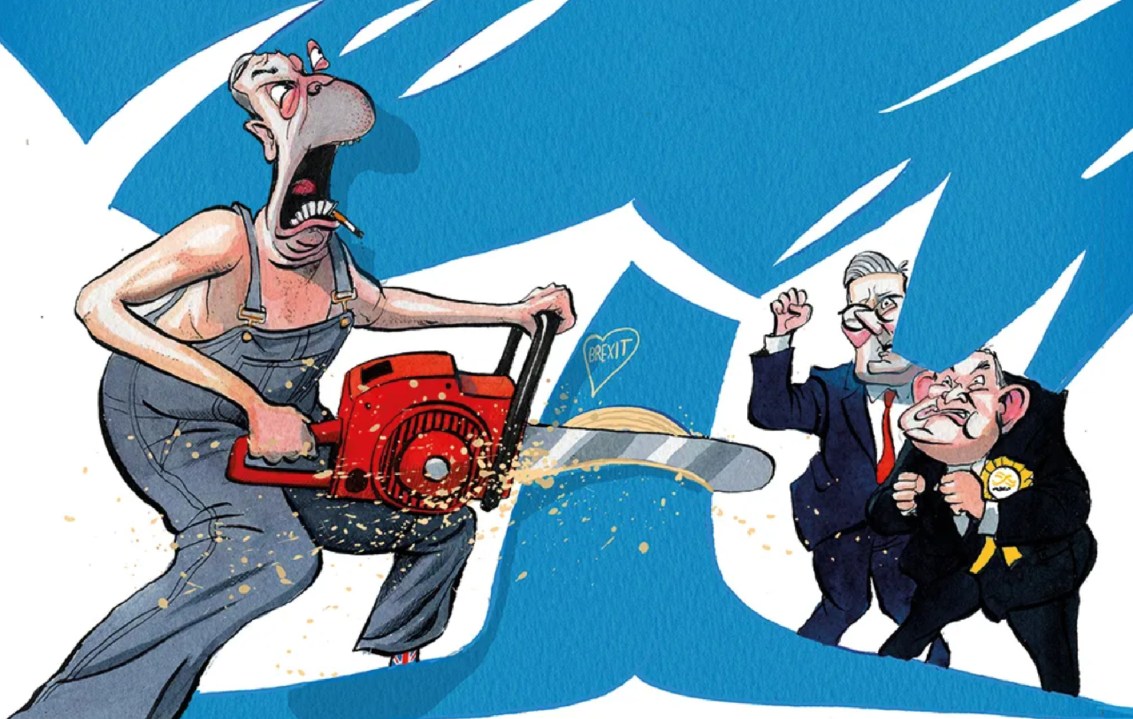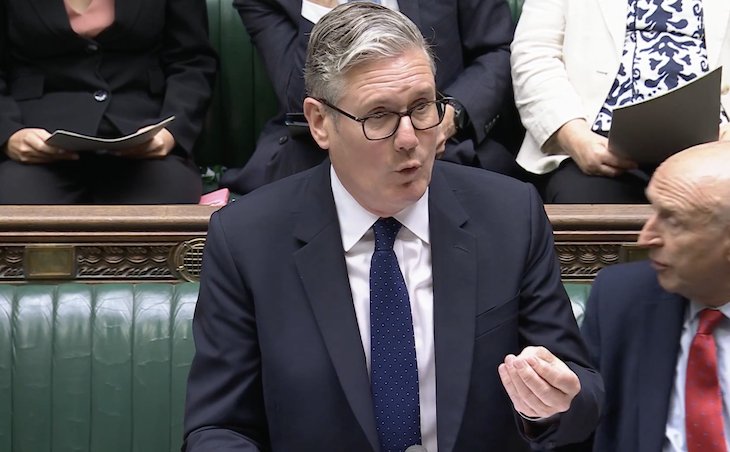On Tuesday afternoon, a familiar figure pulled up at a Westminster café to plot the Tories’ downfall. Nigel Farage beamed from the back of his black Range Rover as he arrived to welcome Reform’s latest recruits. The purpose of the Old Queen Street summit was to plan the party’s path to next year’s local elections in May. Where better to scheme than in the neighbouring street to Conservative Central Headquarters?
‘It baffles me how we’re the most successful political party in the western world,’ says one Tory
While the Tories are enjoying a four-month leadership contest, Farage and his aides are hard at work. A constitution has been drafted to turn the limited company into a proper political party, with parameters to prevent any Ukip-style feuding. More than 100 local branches will launch in the coming weeks to marshal 75,000 paying members. Regardless of who the next leader of the opposition is, Reform is preparing for spring.
The summer recess means the scale of the Tory loss is yet to truly sink in. In the aftermath of 1997, there were three-and-a-half times as many Conservative MPs as Liberal Democrats. Now, the gap between the two parties is fewer than 50. ‘It’s only when you watch them bobbing up and down every two minutes in the Commons that you see it,’ says one Lib Dem veteran. Ed Davey has his sights fixed on the South West, where his party performed poorly in the 2021 locals. The Greens too are looking to traditional Tory areas, after general election triumphs in Waveney Valley and North Herefordshire.
Nearly half of the remaining Tory councillors are up for election in May. Between 2022 and this year, the party lost 2,000 wards in local elections. The councillors fighting in the spring won their seats back in 2021, when ‘Borismania’ was at its peak and Hartlepool was turning blue. Labour now has an 8,000 vote majority in the town and the Tories have been pushed into third by Reform. Within CCHQ, staff report a feeling of drift. Campaign managers have departed and mayoral nominees are yet to be chosen. ‘The locals will expose how bad our ground game is and how bad our associations are,’ says one insider.
The six contenders for the Tory leadership might have some sense of that, after weeks of visiting garden fetes and provincial golf clubs. The national tours allow candidates to listen to their party. This summer ‘is a test of how committed people are to campaigning now,’ says one campaign source. ‘And how effectively they can run an operation. It’s interesting that some are falling short.’
Cleverly is visiting up to a dozen associations a week; Robert Jenrick boasts 16. ‘He’s the Princess Anne of this contest,’ declares one supporter. In two weeks, the six will become four, when MPs return to parliament for the first knock-out stage. There will then be another month before the final two are announced in October. The timing means this year’s party conference will be very different. ‘Normally, it’s the members going to listen to the leader,’ says one CCHQ old-timer. ‘This time, it’ll be the leaders listening to the members.’
‘Party reform’ is the phrase on the contenders’ lips, after a bruising election in which few Tories give CCHQ much credit. Currently, the relationship between the Tory high command and its members is based on understanding and trust: CCHQ doesn’t understand its activists and the grassroots don’t trust it. Volunteers bemoan being treated like cannon fodder while apparatchiks complain members don’t do enough for the party. MPs often grumble about both. One defeated Tory likes to tell a story from his days as a councillor. After urging his fellow members to do more campaigning, the ward chairman quit in disgust on the grounds that the branch had become ‘too political’. To resolve schisms such as these, the six contenders are suggesting different party reforms.
Some, such as Priti Patel, want members to vote for the chairman; Mel Stride backs more ‘directly elected representation at the head table’. Others disagree, citing conflicting mandates. ‘You’d get a de facto deputy, like Watson and Corbyn or Rayner and Starmer,’ says one rival. Kemi Badenoch is in ‘listening mode’, but told supporters at last weekend’s rally that ‘there is too much centralisation’ in party headquarters.
Two aspects in particular spark most ire: campaigning and candidate selection. Many of the 175 Tory incumbents who lost their seats last month speak bitterly of the ‘80:20’ strategy which poured resources into long-gone marginals. In Hendon, meanwhile, activists claim members were directed away a fortnight before polling day. The Conservatives lost the seat by just 15 votes. ‘It baffles me how we’re the most successful political party in the western world,’ says one Tory.
High command can give the impression that it cares less about a fair process than giving safe seats to favoured sons. It is unsurprising that there are thus calls to reform it. Most candidates are now promising to give members a greater say in picking their proposed MP: Jenrick even wants to scrap the CCHQ-approved candidates’ list so that any member can stand. His launch was attended by David Campbell-Bannerman, head of the Conservative Democratic Organisation – and sworn opponent of CCHQ fixers.
A clear-out seems likely whichever contender wins. Gareth Fox, the much-maligned head of the candidates’ department, will soon leave his job. After 14 years, there has been a ‘diminishing return in talent’ says one aide, who points to the number of ex-CCHQ staff now ensconced in the Lords. Arguments on staff retention often mirror those on Whitehall reform: hire fewer staff but pay them more. There’s a case for more modern fundraising bodies, too. ‘Something like Labour Together, removed from Central Office politics, would be useful,’ says one ex-staffer.
Of course, making and breaking promises to party members is no bar to elected office: just ask Keir Starmer. But proper reform of the old association model would both revitalise the withered grassroots and demonstrate the mettle of a new leader. ‘Change Labour. Change Britain’ was Morgan McSweeney’s mantra after the Hartlepool loss three years ago. Today’s Tory contenders could do worse than adopting that approach.
Listen to Coffee House Shots:









Comments